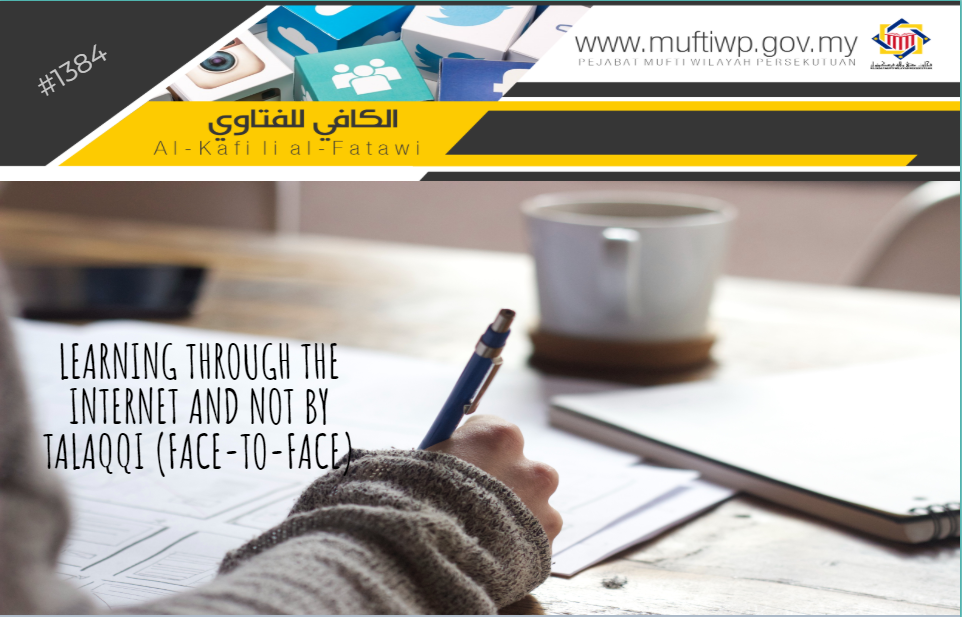Question:
Assalamualaikum. What is the opinion of Mufti regarding the students who obtain knowledge through the internet and etcetera while forsaking talaqqi?
Answer:
Alhamdulillah, praise and thanks to Allah for the countless blessings He has blessed us all with. Blessings and salutations to the Prophet Muhammad PBUH, his wives, his family, companions and all those that follow his teachings to the day of judgement.
We start with the verse of al-Quran:
وَمَا كَانَ الْمُؤْمِنُونَ لِيَنفِرُوا كَافَّةً ۚ فَلَوْلَا نَفَرَ مِن كُلِّ فِرْقَةٍ مِّنْهُمْ طَائِفَةٌ لِّيَتَفَقَّهُوا فِي الدِّينِ وَلِيُنذِرُوا قَوْمَهُمْ إِذَا رَجَعُوا إِلَيْهِمْ لَعَلَّهُمْ يَحْذَرُونَ
“And it is not for the believers to go forth [to battle] all at once. For there should separate from every division of them a group [remaining] to obtain understanding in the religion and warn their people when they return to them that they might be cautious.”
Surah al-Taubah (122)
Al-Alusi said: “Apparently, the phrase ‘warn’ (لِيُنذِرُوا) fittingly replaced by ‘teach’ (لِيُعْلِمُوْا) and the phrase ‘be cautious’ (يَحْذَرُونَ) fittingly replaced by ‘be deeply understood’ (يَتَفَقَّهُوْا). However, both phrases (warn and be cautious) are chosen as an indication that the main role of a teacher is to warn people. While, the main role of a seeker of knowledge is to be God-fearing, neither obtaining leisure nor arrogance with knowledge.” (Refer: Ruh al-Ma’ani, 11/48)
Syeikh al-Maraghi said: This verse is revealed to complete the rulings related to struggle, which is the ruling of seeking knowledge and understanding it in-depth. Which means, obtaining knowledge in-depth is one of the struggles through hujjah (argument), presenting evidences, calling people towards faith and establishing the joints of Islam. (Refer: Tafsir al-Maraghi, 6/2937)
By understanding the above saying of Allah, it clearly exhibits the commandment of obtaining knowledge through learning and studying with teachers. This is the basic of learning. It is supported by a hadith narrated by Abi Darda’, where the Prophet PBUH said:
يَا أَيُّهَا النَّاسُ إنَّمَا الْعِلْمُ بِالتَّعَلُّمَ وَالْفِقْه بِالتَّفَقُّهِ
‘O people! Verily, knowledge is obtained through learning and fiqh is obtained through tafaqquh (understanding)’
Narrated by Al-Tabarani in al-Mu’jam al-Kabir (395)
Al-Hafiz Abu Bakr al-Khatib al-Baghdadi said: “The knowledge is not obtained unless through the mouths of the scholars”. (Refer: al-Faqih wa al-Mutafaqqih, 2/192)
Imam Muslim recorded in the introduction of his Sahih as narrated by Muhammad ibn Sirin, where he said:
إِنَّ هَذَا الْعِلْمَ دِيْنٌ فَانظُرُوْا عَمَّنْ تَأْخُذُوْنَ دِيْنَكُمْ
‘Indeed, this knowledge is faith, so carefully consider from whom you take your faith’ (Refer: Muqaddimah Sahih Muslim, 1/11)
Abdullah ibn al-Mubarak said:
الْإِسْنَادُ مِنَ الدِّيْنِ لَوْ لَا الْإِسْنَادُ لَقَالَ مَنْ شَاءَ مَا شَاءَ
‘The Chain or narrator is from Dīn, and were it not for the chain of narrator whoever wished could say what he wanted’(Refer: Muqaddimah Sahih Muslim, 1/12)
Nevertheless, for those who already master the tools of religious knowledge like Nahu, Sorf Balaghah, Adab, Arabic Language as well as various disciplines, hence, they are permissible to read and comprehend in obtaining knowledge. This added up by learning through the internet as an added value or additional information and knowledge is a permissible, but one should not depend solely on the internet. This is acknowledged by scholars because sometimes, the information provided on the internet is mixed with truth and false, while some does not follow the disciplines of knowledge. A famous legal maxim states:
إِنْ كُنْتَ نَاقِلًا فَعَلَيْكَ بِالتَّصْحِيحِ وَإِنْ كُنْتَ مُدَّعِيًا فَعَلَيْكَ باِلدَّلِيلِ
“If you are the one who convey, then you must provide verification, and if you are the one who claims, then you must provide supporting evidences or proofs” [1]
Students should always have muzakarah (discussion) with the scholars and make asking questions on things they do not know or is confused with as a habit. This is widely practiced by the salafus soleh, so the truth may always be with them. Hence, for this particular group of people, the ruling of learning, reading and comprehending after the phase of ta’lim and great mastery in the said discipline is permissible.
Read the history on how the four major madhabs; Imam Abu Hanifah, Imam Malik, Imam al-Syafie, Imam Ahmad seek knowledge from numerous scholars and for a long period of time. This clearly shows that those who are of the level of a mujtahid or mustaqil still seek knowledge, learn and are persistent by it through a long period of time.
Conclusion
We state here, obtaining knowledge should be preceded by talaqqi as well as gathering them directly from the words of the teachers through syafawi (confrontational). This is what is practiced by the early Islamic generation among the companions who acquired knowledge from the Prophet PBUH. The same goes for generation after them.
Al-Syeikh Muhammad ‘Awwamah wrote a book, Ma’alim Irsyadiyah li Sina’ah Talib al-‘Ilmi which explains the forms of talaqqi and acquiring of knowledge as well as comparing between traditional and modern learning system. We also had reviewed briefly on this through our mini-book entitled Tinta Nasihat Untuk Penuntut Ilmu (‘Words of Advice for Knowledge Seekers’)
Through this explanation, it is hoped that we all may be persistent in seeking knowledge in learning and comprehending from eligible masyayikh (teachers) and not merely by reading without learning from them. We close this with a du’a:
اللّهُمَّ فَقِّهْنَا فِي الدِّينِ، وَعَلِّمْنَا التَّأْوِيلَ
O Allah! grant us deep understanding of religion and teach us (correct) interpretation
اللَّهُمَّ إِنِّي أَسْأَلُكَ عِلْمًا نَافِعًا وَرِزْقًا طَيِّبًا وَعَمَلاً مُتَقَبَّلاً
‘O Allah, I ask You for beneficial knowledge, goodly provision and acceptable deeds’
Musnad Ahmad (26521), Ibn Majah (925), Ibn Abi Syaibah in al-Musannaf (29265) and al-Baihaqi (1645)
End Notes:
[1] This is the opinion of the scholars in the field of al-bahth wa al-munazarah. It is stated by Fadilatu al-Syeikh al-Allamah Abd al-Rahman Habannakah in his book Dawabit al-Ma'rifah wa Usul al-Istidlal wa al-Munazarah (pg. 368 and 381).


